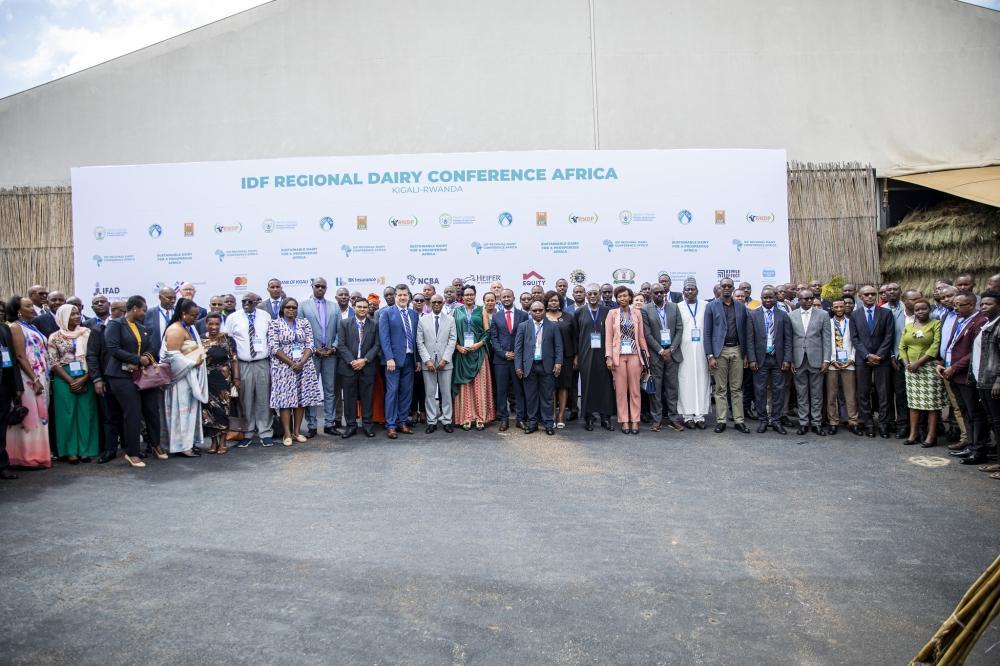Africa-Press – Rwanda. Experts gathered in Kigali for an inaugural dairy conference are exploring ways to increase milk production and the industry value chain development to improve both consumption and income of its actors.
The International Dairy Federation (IDF) Regional Dairy Conference Africa 2025 – the first of its kind to take place in Africa – is held under the theme “Sustainable Dairy for Prosperous Africa.”
Rwanda’s Minister of Agriculture and Animal Resources, Mark Cyubahiro Bagabe, said that a strong dairy value chain, ranging from production, value-addition, marketing and consumption, is the mainstay of a prospering sector. This is because, any weakness in one link affects the entire system, he noted.
While smallholder farmers are the backbone of the dairy sector, he said, only 10–15 per cent of them in Africa access formal training or finance. Equipping them with skills and tools will build a more resilient and job-creating dairy economy, he stated.
With production inefficiencies, he said that milk productivity per cow remains low in Africa, citing Rwanda where the average is less than 10 litres, though some stockbreeders can get up to 40 litres per cow.
Florence Musiime Murungi, the Executive Secretary of Rwanda National Dairy Platform (RNDP) — which brings together actors in the country’s dairy industry, including farmers – said that Rwanda made progress including the establishment of an agriculture and livestock insurance scheme to protect farmers from losses, and improvement in dairy milk supply chain.
However, she said that challenges remain, citing water scarcity for cattle consumption and limitations in feeding, especially during dry season, indicating that proper feeding and water consumption are critical to milk output.
“But we commend the government and other partners for the efforts they are making to address the shortage of water in farms, including to support us to produce fodder needed for us to achieve the milk output we want,” she said.
Bagabe said that one of the challenges to sustainable dairy farming is climate change, especially drought which significantly results in reduced milk production, thus negatively affecting the supply chain. On what Rwanda is doing to address such a concern and ensure production and supply sustainability, he cited building dairy farming resistance to climate change, saying that the country is enhancing management performance in areas including insurance and mitigating climate change effects.
“We are providing farmers with water in their farms. We are teaching them how to stock fodder and forage for the difficult times when it’s dry. So those are the insurances against climate change. We’re providing solutions towards feeding, meaning that they have feeds even during the dry season,” he pointed out.
Adopting advanced technologies to promote genetic improvement, adequate feeds and veterinary services, can raise productivity by up to 30 per cent, Bagabe said, stating that “innovation is key to our region’s competitiveness and sustainability.”
He said that the forum fosters collaboration among governments, development partners, the private sector, farmers and farmers cooperatives, indicating that by working together, “we can overcome barriers and scale innovations for sustainable dairy development.”
“Such a collaboration model has remarkably contributed to Rwanda’s dairy sector growth,” he said, indicating that the country’s milk production more than tripled from 334,727 tonnes in 2010 to more than one million tonnes in 2024, while per capita milk consumption doubled with an increase from 37.3 to 79.9 litres.
IDF President Gilles Froment highlighted the dairy sector’s significant global impact, saying it is nourishing about six billion people, providing livelihood to more than one billion people through more than 150 million households around the world.
“By leveraging cutting-edge technology and fostering international partnership, he said, “we can ensure the long-term viability of the dairy sector, which benefits producers, processors, suppliers, everybody across the supply chain, and the consumer worldwide.”
Moving forward, he said, it is essential to continue embracing sustainability in all of its dimensions and at all levels of the dairy value chain.
“This includes maintaining and even increasing the productive capacity of the dairy sector, providing decent livelihoods for all stakeholders, and adapting to global challenges such as climate change and market fluctuations. By working together, we can build a resilient and sustainable global dairy ecosystem,” he said.
For More News And Analysis About Rwanda Follow Africa-Press






